Review – Pueblo Espíritu
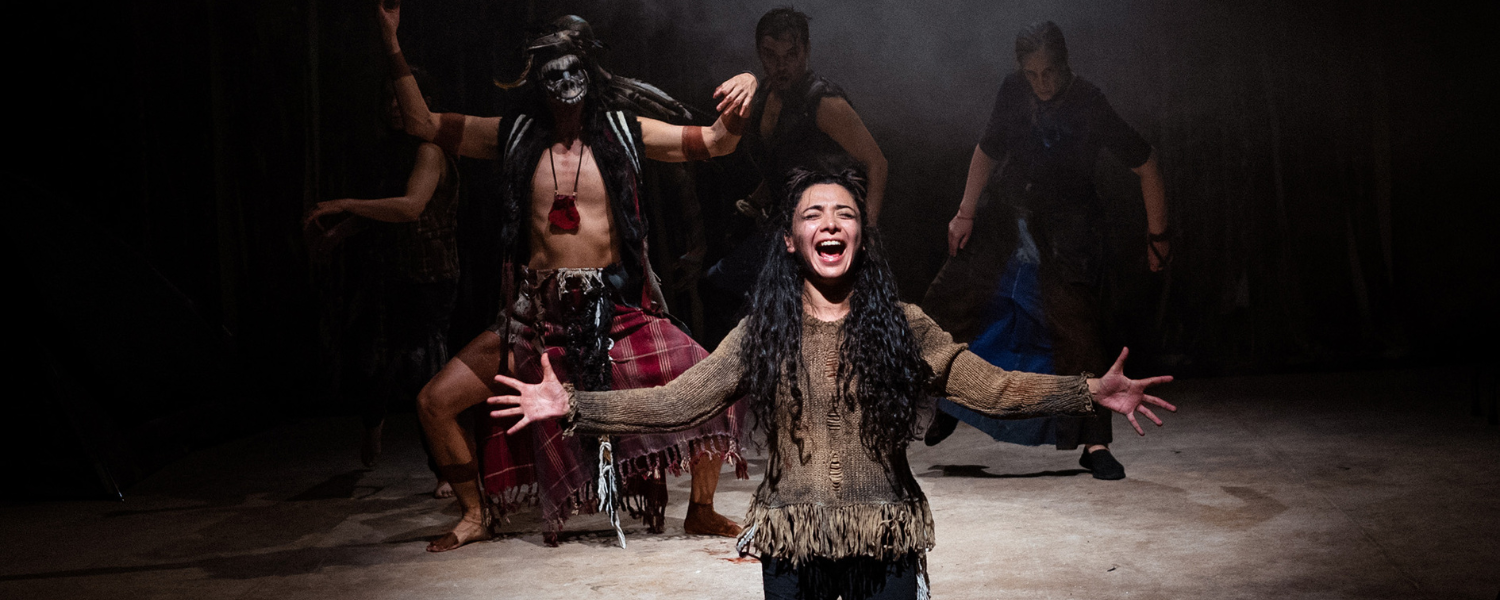
Pueblo Espíritu devised by Organización Secreta Teatro
Reviewed by Amanda L. Andrei
Clutching their face masks and backpacks, four exhausted individuals stumble into a strange forest. Nerves clearly shot, they spray disinfectant at each other and come to blows, but not before a fifth person appears, coughing so hard that they fall to the ground. In the ensuing silence and weight of paranoia, the individuals surrender to their fatigue—and to the spirits of the surrounding land.
So starts Pueblo Espíritu (“Spirit Town”), a wordless multimedia performance devised by Mexico City’s experimental Organización Secreta Teatro and directed by company founder Rocío Carrillo. Wordless, yet carried by character grunts and overhead music swelling with drums and chants, the ensemble (Beatriz Cabrera, Alejandro Joan Carmarena, Brisei Guerrero, Stefanie Izquierdo, Ernesto Lecuona, Mercedes Olea, and Jonathan Ramos) remake their post-apocalyptic environment by communing with the wildness of the spiritual world and returning to embodied material-making practices, such as weaving and ceremonial medicine.

There’s still peril in the spiritual world, though, and tension between physical, social, and spiritual boundaries explored more through dream logic than by way of any definitive storyline. A gloriously painted bird-entity (Carmarena) seems to have power over the dead, but is also susceptible to the tricks of a feral girl (Izquierdo) who appears to be negotiating her status as human, animal, and warrior.
A medicine man (Ramos) leads the group in a ceremony where a fierce feminine divinity arises and dances amidst dangerous laughter (Guerrero), while afterwards an archer and hunter (Lecuona) deals with a terrifying apparition and deer-like spirit (Cabrera) in what could be a nightmare or the birth of something more sinister.
An elderly woman (Olea) observes and absorbs much of this pain, sometimes serving as a guide and other times as a witness.
Carrillo’s direction steers the ensemble between swift dances, tender embraces, and erotic animalistic movements to portray the porous interdimensionality of the worlds. Erika Gomez’s design conjures up a lavish natural world, yet one still marred by civilization and prone to interruption. The mask and makeup elements are particularly inspired and detailed, turning ordinary humans into supernatural creatures in mere moments.
If I could change one thing about the production, I would wish for better audio quality or live performance of the music. While the melodies are epic and reminiscent of traditional indigenous songs, the overheard sound and its slightly tinny quality could be distracting, and moments of the actors lip-synching or chanting along with the soundtrack lent me a slight feeling of uncanny disembodiment, a friction between the digital and the live performance clashing with my visual and aural senses in a way that took me outside of this otherwise enchantingly bewildering world.
However, this friction made silences onstage and any subsequent ensemble noises (sans sound) even more poignant and profound, as the echoes faded and wrapped the audience within a reverent stillness.
While Pueblo Espíritu has a limited run at the Latino Theater Company with only five performances until May 7, the ensemble will also be performing Las Diosas Subterráneas (“Subterranean Goddesses”), an experimental adaptation of the Greek myth of Persephone (the maiden goddess kidnapped by the god of the underworld) juxtaposed with the story of Luz García, a character based on real-life women kidnapped by human traffickers.
With these two stories intertwining, the ensemble seeks to portray the story of mothers looking for their missing daughters while finding strength in community. With these two performances, Organización Secreta Teatro gives us an entryway into vigorously magical worlds, inviting us to examine our own relationships with spirit, land, and power.
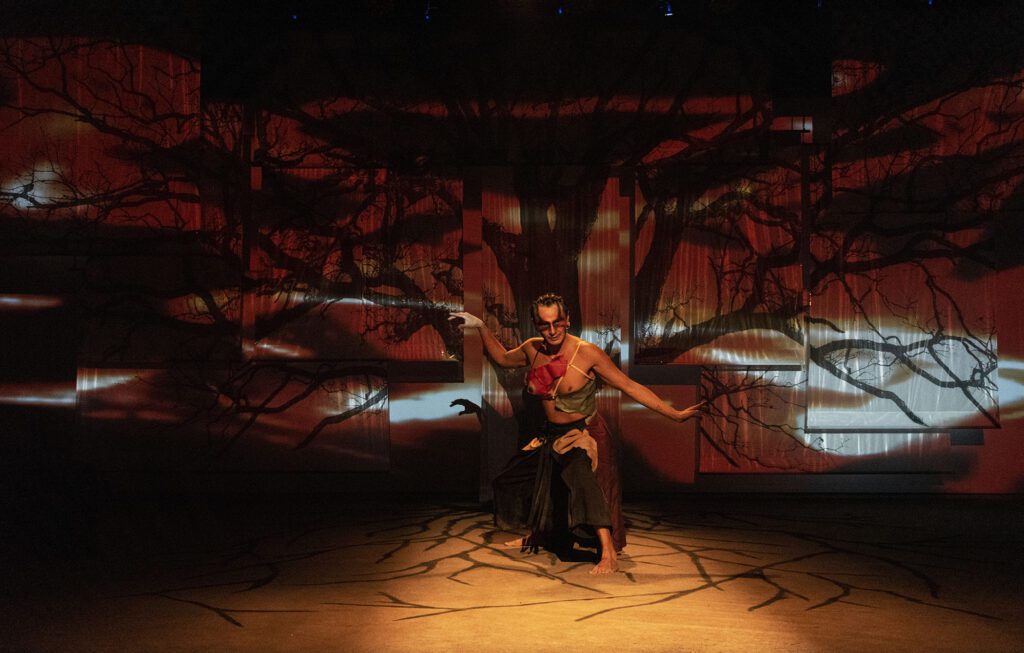
Pueblo Espíritu had five performances, concluding on May 7.
Las Diosas Subterráneas performs the following week, on Wednesday, May 10 at 8 p.m.; Thursday, May 11 at 8 p.m.; Friday, May 12 at 8 p.m.; Saturday, May 13 at 8 p.m.; and Sunday, May 14 at 4 p.m.
Tickets range from $22–$48, except opening night (May 3), which is $58 and includes pre- and post-show receptions. The Los Angeles Theatre Center is located at 514 S. Spring St., Los Angeles, CA 90013. Parking is available for $8 with box office validation at Joe’s Parking structure, 530 S. Spring St. (immediately south of the theater).For more information and to purchase tickets, call (213) 489-0994 or go to www.latinotheaterco.org
Pueblo Espíritu photos by Ángela Chapa
Las Diosas Subterráneas photo by Erika Gómez
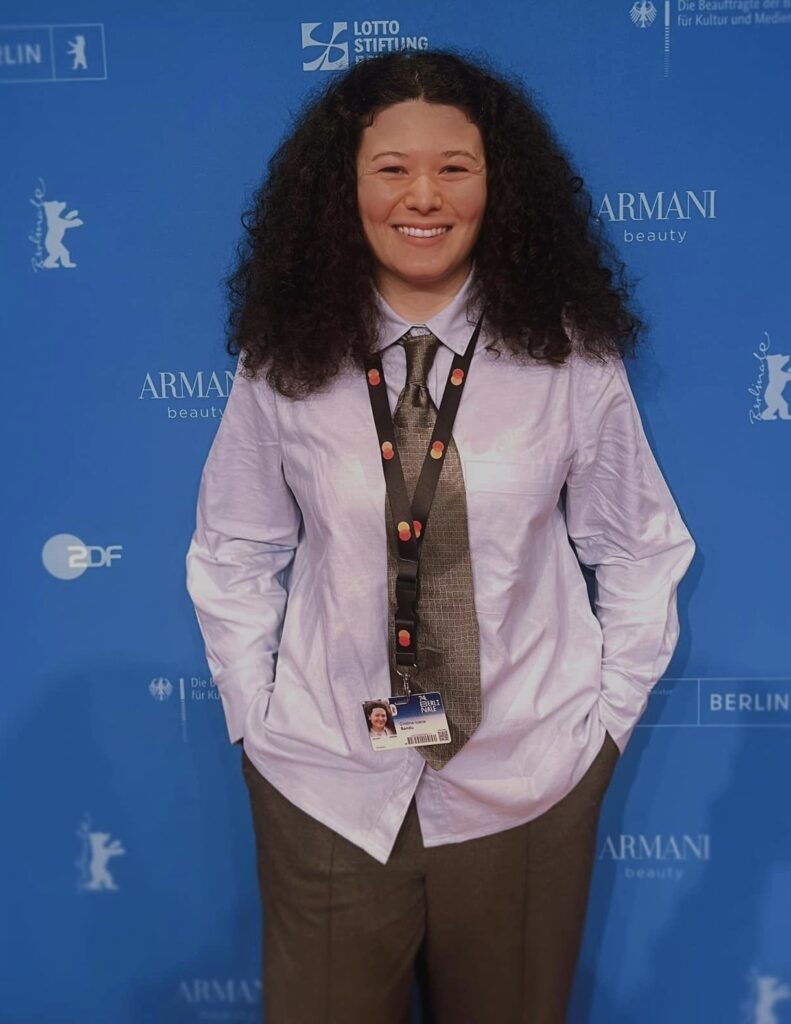
Cristina Sandu Bio: Journalist Cristina-Ioana Sandu graduated from De Montfort University in the UK and is passionate about photography, cinema, music, and storytelling. With a background rooted in journalism and media, Cristina brings a vibrant perspective to her work, shaped by hands-on experience in the film industry and live event production.
Her journey also includes crafting compelling narratives that explore identity, art, and human connection. Her blog acts as a personal and creative space to document life, celebrate authenticity, and highlight significant voices in arts and culture. Discover more at: www.cristinaioanasandu.com
SUPPORT SEEFEST
Not a member yet? Become an art patron with other SEEfest arthouse aficionados in support of great events and programs. Our mission is to keep you informed about initiatives from our wide network of fellow cultural organizations.
We Welcome YOU!
Review – I Do Not Take My Name for Granted
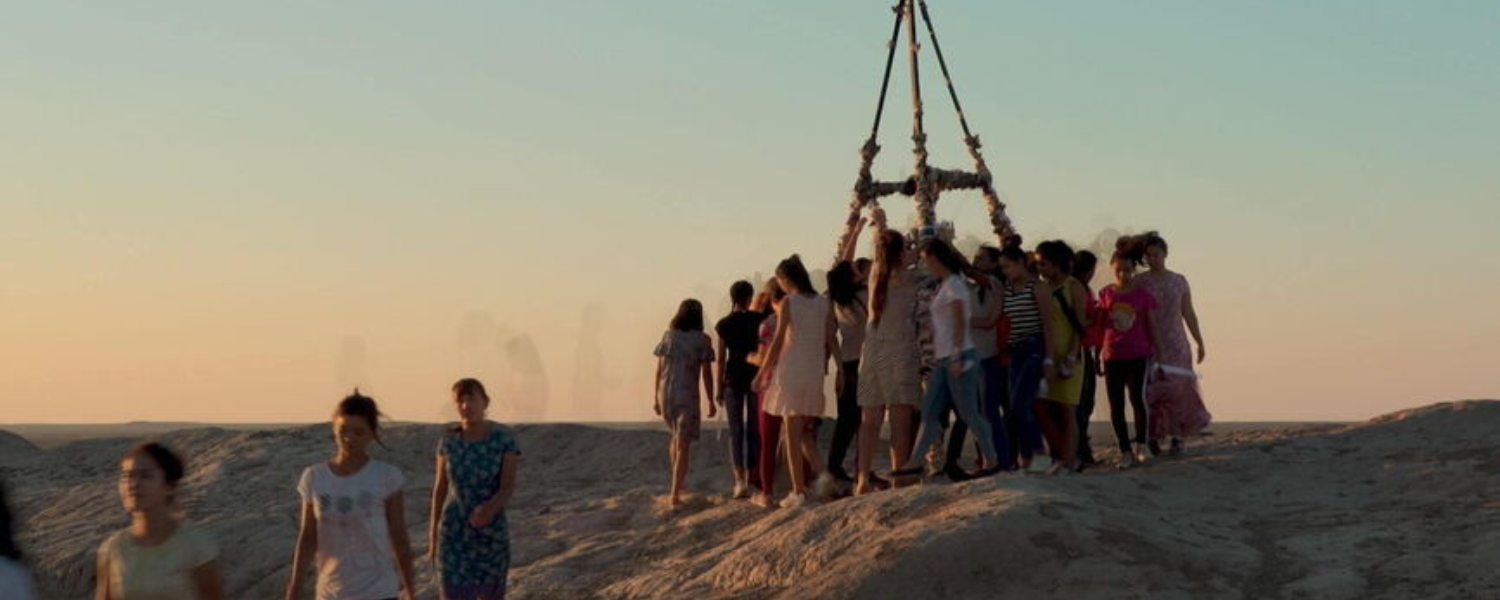
I Do Not Take My Name for Granted: Four Short films by Saodat Ismailova
Reviewed by Amanda L. Andrei
March 6, 2023, at REDCAT, Roy and Edna Disney CalArts Theater
The longer you gaze at the steep cliffs, the more you start to see shapes of women. Vintage footage of Soviet tanks gives way to the dilating pupil of a tiger. And the image of women—whether preserved through oral tradition, a nation’s cinema, or a fading ritual of movement on a mountain—emerges from deep within the cultural memory of Saodat Ismailova’s four short films at REDCAT, curated by Jheanelle Brown.
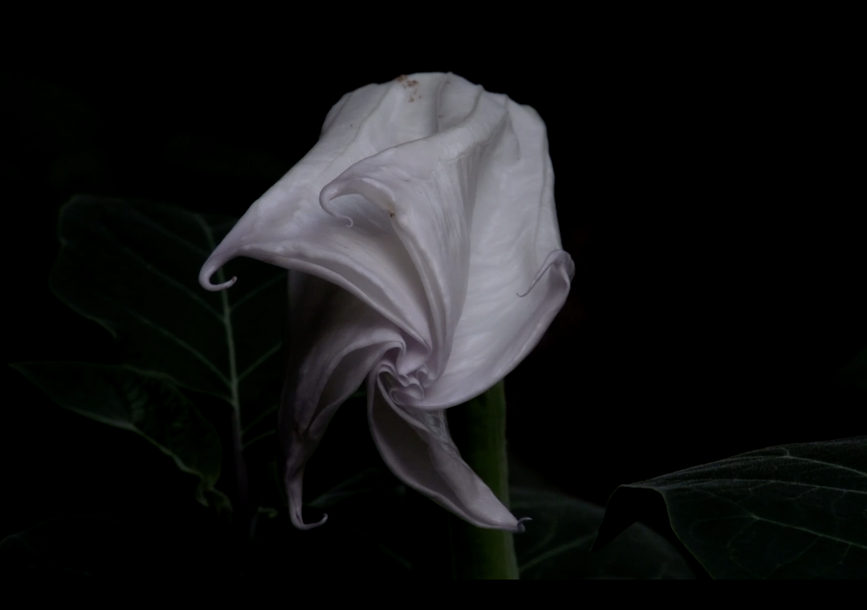
Gulaim (2014) starts the journey, a monologue of the heroine Gulaim from the Central Asian epic Qyrq Qyz (40 Girls), a narrative preserved in the oral folklore of the Qaraqalpaqs, a Turkic group native to Karakalpakstan, an autonomous republic within Uzbekistan.
Cliffs bathed in setting sun rays mingle with closeups of a young woman’s face and hair, the blue flanks of a horse, and a blooming moonflower, as a narrator relates how her father used to shower her with affection in her childhood. Now she refuses to marry a man he has chosen for her, marking a new chapter in her life as she moves from favored daughter to something more liminal and uncertain.
The breathtaking landscapes and intimate details of hair, clothing, and animals—as well as surreal images of veils, chainmail, and a theatrical stage—draw the audience into both large and small scales of beauty and betrayal on ancient and modern levels.
The following film, The Haunted (2017), depicts an imaginary encounter with a Turkestan tiger that became extinct due to Russian colonization of Turkestan in the 1940s.
As sportsmen and military personnel hunted the tigers and the sacred animal’s habitats were converted into land for cotton crops, the tigers were declared extinct in the 1970s. A female voice quietly yet intensely mourns the loss of sacred love and connection over images of grainy black-and-white footage evoking colonization, which are juxtaposed against intense closeups of a live tiger’s eyes, whiskers, and deep fur.
Shots banks its former habitat are motionless amidst the river banks’ greenery, as if waiting for the empty space to once again be filled with soft pawprints and striped skin.


Her Five Lives (2020), commissioned as part of Asian Film Archive’s Monographs, a series of essays on Asian cinema, presents five different archetypes of heroines in Uzbek cinema from the past century, starting with Vyacheslav Viskovsky’s 1925 film, The Minaret of Death, based on a 16th century myth of the Bukharans, an ethnoreligious Jewish group in Central Asia.
Early silent black-and-white film of women as victims of patriarchy transitions into portrayals of women under communism, reform, perestroika, and eventually independence (albeit a confused one).
In contrast to the first two films, this short is faster paced and draws upon more recent cultural memory in the form of archival film, with some of the last footage from Ismailova’s 2014 film, Forty Days of Silence. It’s exciting to watch the transformation of the cinematic portrayal of Central Asian womanhood, making one wonder how to access and watch these films now.
The final film, Chillpiq (2018), depicts a group of girls climbing the ruins of Chillpiq, an ancient funerary structure founded by Zoroastrians and located in Karakalpakstan.
They surround a flag pole, tying rags and circling the pole in the light of the fading sun. From a visual standpoint, the film seems more like a documentary, grounded in realism and with steady shots of the young women as they climb up the mountain. But as they conduct their ritual in silent determination, there arises a feeling of quiet glory that only comes through steadfast devotion.
These contemporary women somehow know how to honor the earth and the unseen, and the earth and unseen return the honor.
While Ismailova’s films have been showcased in museums and film festivals, with her work currently held in collections of Amsterdam’s Stedelijk Museum and the Centre Pompidou in Paris, this one-night event marked the first time that her films have been screened theatrically in Los Angeles.
Her films are a treasure, giving outsiders a rare glimpse into Central Asian ritual, history, and personhood. To see them in a cinema is a reverent experience, offering the chance to immerse ourselves in our own cultural memories and re-examine the myths, landscapes, and archetypes that we hold dear.
Reviewer Amanda L. Andrei is a Filipina Romanian American playwright, literary translator, and teaching artist residing in Los Angeles by way of Virginia/Washington DC. She writes epic, irreverent plays that center the concealed, wounded places of history and societies from the perspectives of diasporic Filipina women, and she translates from Romanian and Filipino to English. For more information on her work and upcoming events, visit: www.AmandaLAndrei.com

SUPPORT SEEFEST
Not a member yet? Become an art patron with other SEEfest arthouse aficionados in support of great events and programs. Our mission is to keep you informed about initiatives from our wide network of fellow cultural organizations.
We Welcome YOU!
Review: Night truck driver

Night truck driver, By Marcin Świetlicki
Translated from Polish by Elżbieta Wójcik-Leese
Poetry
ISBN 9781938890802
128 pages
Bilingual: Polish and English on facing pages
Reviewed by Amanda L. Andrei
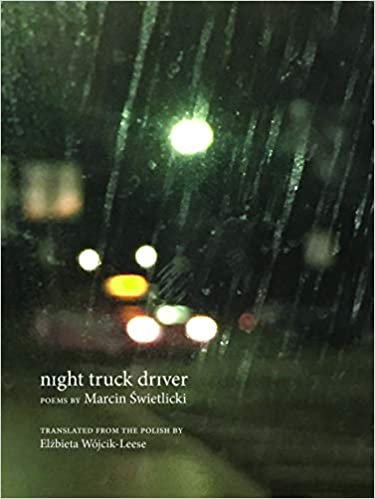
The world drips. Caught in some kind of thaw, circling a winter on the verge of melting into a dream, or a dream solidifying into a cold city, Marcin Świetlicki’s Night truck driver (Kierowca nocnej ciężarówki) translated by Elżbieta Wójcik-Leese, immerses us into icy, hypnopompic places where we can hear Death and other unseen forces calling to us—and maybe even respond to them.
The opening poem, “Preface,” invokes the biblical origins of Genesis, reset in 1960s Poland: a man, a woman, a snake, but also “a stupid apple tree,” “depots, dead buses. / Old lemonade bottles of that unusual shape.” Here are seeds of Świetlicki’s themes: an overpowering sense of menace between sleep and waking, entanglements between the masculine and feminine beyond mere mortals, set among noirish urban landscapes and frosty worlds. The final line, “We’ll be observing the advance of darkness” sets up the reader for the opaque stillness at the heart of winter, questioning what life, if any, remains beneath the cold.
“Everything drips” follows immediately with an imperative, or maybe even a plea: “Don’t come into my dreams, don’t. In one dream / drown for good and don’t show up in any other.” To whom is the speaker addressing? A relative, a lover, a stranger, a monster? The ambiguity of other people’s presences in this poem and others compounds the sense of unease, giving you the sense of a faintly remembered nightmare just out of reach, or a stranger passing by your unlit house. Later on, in “Saturday, an impulse” the speaker announces, “Evil has come to my dream,” after which a female presence instructs them to undress and return to bed where they embrace. Other poems suggest the speaker is themself a dream, conjured by a stone or a stone moon, or a person falls asleep in broad daylight, searching for a missive in the world of sleep. The space between dreamer and reverie is not simply porous or overlapping: it is all-encompassing, cavernous, dissolving into the ache of the unknown.
The female presence in the dreams, waking life, and spaces in between appears to be a lover, the mother of the speaker’s child—or perhaps many lovers, or many mothers—but also an anonymous, distant figure(s) who seems to be on a parallel yet displaced wavelength from the speaker. The speaker seems to be in constant dialogue with this presence and others like it, and even when those energies are absent from the poem’s scene, the speaker continues evoking, recalling, and defying them. Herein is the brilliance of Wójcik-Leese’s translation that melds this shadowy feminine presence with that eternal, ever-present mystery: Death.
One poem in particular showcases the paradox of having a relationship with that mystery. “Posthumous correspondence” (Korespondencja pośmiertna) takes the shape of a stage or screenplay script in which a Man dialogues with Death. Glancing on the left side of the page at the Polish, I observed that the poem followed a different structure, without the character/dialogue formatting.
Curious about this choice, I reached out to Wójcik-Leese, who explained that in Polish, death is grammatically feminine, and so verb endings signifying grammatic gender reveal which passages are spoken by Death and which passages are uttered by the other person. In their translation collaboration, Świetlicki suggested pointing out the different speakers in the exchange, which resulted in a fascinating version of the original poem in English. Both correspondents seem to be speaking aloud (as if in a script), but the framework of the text is as a letter. The reader feels the conflict and contradictions of their communication—not merely between speakers and what they speak of, but how they speak to each other and the plaintive rhythm of their exchange.
Towards the end of the collection, the poems become sparser, more like jottings and diary entries. It’s as if the narrator is integrating the past, musing over the present and future, where “Plastic soldiers utter their war cries” in the ironically titled, “First poem” which is the third to last in the volume. Maybe this is the first poem for a new world or worlds, a transition point for more. It’s significant that Świetlicki has written thirteen books of poetry and that Night truck driver is the first English language collection in his work, which Wójcik-Leese notes in the translator’s afterword “follows the chronology of his poetic life and the lives of his individual volumes.” One hopes that more translations will come, as Świetlicki and Wójcik-Leese capture so hauntingly and precisely the cold ache of being called—and caught—among many worlds.
Radio Interview with Trafika Europe where you can hear Elżbieta Wójcik-Leese read the poems in Polish and English.
Reviewer Amanda L. Andrei is a Filipina Romanian American playwright, literary translator, and teaching artist residing in Los Angeles by way of Virginia/Washington DC. She writes epic, irreverent plays that center the concealed, wounded places of history and societies from the perspectives of diasporic Filipina women, and she translates from Romanian and Filipino to English. For more information on her work and upcoming events, visit: www.AmandaLAndrei.com

SUPPORT SEEFEST
Not a member yet? Become an art patron with other SEEfest arthouse aficionados in support of great events and programs, as well as our mission to keep you informed about initiatives from our wide network of fellow cultural organizations.
We Welcome YOU!
Theo Angelopoulos – The Landmark UCLA Retrospective
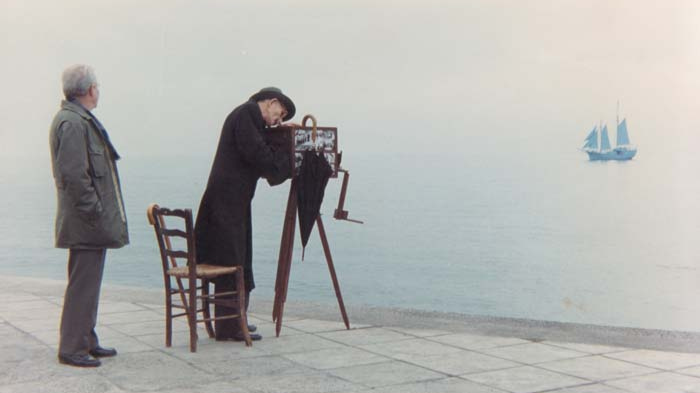
Review by Malina Stefanovska
In the Fall of 2022, the UCLA Film and Television Archive ran a complete retrospective of Theo Angelopoulos, a Greek film director and one of the most famous and beloved filmmakers of South East Europe. The full house of the Billy Wilder theater, the rapt attention of the audience during the many hours of watching, and all the diverse languages spoken around me, made it obvious that his admirers are not only Balkan born, but also a younger generation of film buffs from all over the world. Angelopoulos has won many premier awards, including the Palme d’Or at the Cannes film festival in 1998 for his film Eternity and a Day. Ulysses’ Gaze (1995), won the Grand Jury Prize at Cannes, and Landscape in the Mist (1988) was a winner at the European Film Awards, but it was The Travelling Players—filmed in 1975, during the military junta’s dictatorship in Greece—that established him as a unique voice in cinematography. UCLA’s timely retrospective, titled “Landscapes of Time: The Films of Theo Angelopoulos,” consisted of all the director’s feature films and a selection of shorts. In addition to the films mentioned above, I saw Days of 36, Voyage to Cythera, Alexander the Great, Meadows in the Mist, and The Hunters.
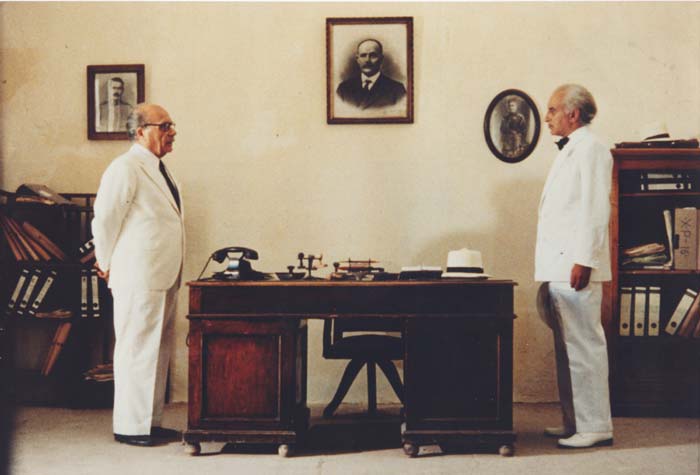
Having seen and loved Ulysses Gaze when it first came out in 1995, while the civil war was still raging in Yugoslavia, I wanted to see some other Angelopoulos’s films. They are so intimately intertwined with our Balkan history that I was ready to immerse myself in an experience that I knew might be unsettling and unforgettable.
I got more than I expected! I spent many hours in utter nostalgia for my Balkan roots, and the torn, conflicted, and stunning world poetically depicted in his films. It was inevitable that I completely surrendered to Angelopoulos’ meditations on history, reliving or imagining it with all my senses: images, music, the slow passing of time, the long shots of Macedonian villages in winter, the feeling of being part of a community, the exile and oblivion that engulfs it all sevdah, this feeling of sadness for what we have left behind, is the Balkan’s heritage from our common Ottoman past, the Eastern equivalent of the Portuguese saudade.
It is a sadness cultivated through beloved musical traditions, and glorified in poetry and cinematography. In a film modeled after Zorba the Greek, such longing would have been represented by drinking, listening to musicians, and breaking dishes, in a sort of communal catharsis.
None of that gesturing was present in Angelopoulos’ films, and I did not miss the expression of feelings in such demonstrative ways. Yet, as a typical daughter of the Balkan South, I was completely immersed in each of his films, gripped and torn by histories so closely intertwined with my own: my family, from what is now officially North Macedonia, came from both sides of the border; my father fought alongside Greek partisans in World War II, and even learned the language from them; the Manaki brothers (in Greek, Manakis)—whose disappeared reels of film are chased throughout several countries by the hero of Ulysses’ Gaze—lived in Bitola, my family’s hometown, and they were my grandfather’s friends. They both belonged to that Hellenophile ethnic minority, the Vlachs, that once created the city’s culture and is slowly disappearing.
Both on screen and in the audience, I heard long forgotten Greek words from my childhood, and—miraculously—I understood them. Even the recordings of village life by the Manaki brothers, shown in the film, brought back memories of my peasant grandmother teaching me how to spin wool. The bombing of Sarajevo, another beloved city of my youth, made me howl like the protagonist of Ulysses’ Gaze (top image), played by Harvey Keitel.
Needless to say, all the music, from the soulful rebetika to the peasant Macedonian music played by my grandfather, was equally and painfully close to my heart. Even my son’s name, Theodor, chosen in homage to my roots, brought me closer to Angelopoulos! It was as if he spoke exclusively to me, a viewer uniquely familiar with his world.
But then, in the rapt silence of the audience, I realized that something much larger than my own perspective and past connected us all. It was Angelopoulos’s unique cinematography and his understanding of history. This was evident by the audience never saying a word, never leaving before films ended (not even for the Travelling Players, which is over four hours long), in the enthusiastic applause after each show, and in the heartfelt and beautiful opening words delivered by UCLA’s head archivist Paul Malcolm and by Ioannis Stamatekos, the Consul General of Greece in Los Angeles, and Sharon E. J. Gerstel, director of the UCLA Stavros Niarchos Foundation Center for the Study of Hellenic Culture.
Theo Angelopoulos has become known as one of the most important filmmakers of the twentieth century. His career spanned from the early 1970s to 2012, when his last film was brought to a standstill by his tragic death during shooting. He was admired by such auteurs as Bernardo Bertolucci and Wim Wenders for his characteristic style: He used slow, ambiguous, overlapping narrative structures and long takes which often included meticulously choreographed scenes and many actors (The Travelling Players consists of only 80 shots in over four hours of film). He also championed a radical Brechtian point of view where the actors at times broke the fourth wall to deliver their narrative directly to the audience.
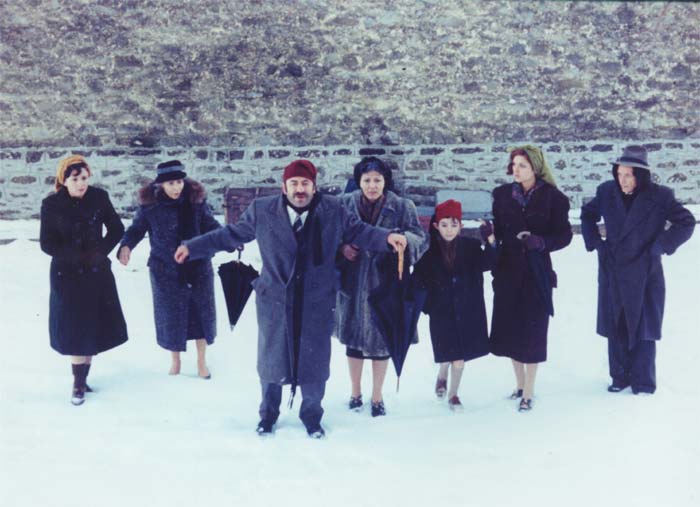
Most of Angelopoulos’s films are shot on the northern border of Greece, in rainy and snowy winter weather, in remote mountain villages. He preferred a dark palette of colors diametrically opposing the usual “tourist-sunny” representation of that country. I came to recognize a few recurring visual tropes: rafts or boats slowly gliding away on a river, a snowed-in mountain village, a long frontal take of a group walking up a slope, a conspiratorial whistle of insurgents that carried across the mountainous landscape. These epic and allegorical meaning are always present, to be interpreted at many levels, akin to a myth.
Angelopoulos’s films are as steeped in mythology as they are in recent Greek history or his own personal quest. In Ulysses’ Gaze, the four different women (played by a single actress, Maia Morgenstern), stand for Penelope, Calypso, Circe and Nausicaa, while its hero—a filmmaker named only “A”—is both Odysseus and a stand-in for Angelopoulos as “auteur.” The Travelling Players retells Aeschylus’s Oresteia, with characters ranging from Orestes and Pylades to Electra, Agamemnon, Clytemnestra and Iphigenia replicating the antique tragedies. The fusion and clash between myth and history is in itself the subject of Megalexander, the story of an early twentieth-century insurgent bandit who saw himself as Alexander the Great. What a pity that Angelopoulos did not live to see Alexander’s latest avatar revived, mythologized and re-appropriated as “Aleksandar Makedonski” in the newly-independent (and heavily politicized) State of North Macedonia!
But the main way in which Angelopoulos’ films touched me is not the retelling of myths, as rich as they can be. It is the more recent Greek and Balkan history, and his poetic and complex rendering of our connection with History at large. Some critics have said that “no one but a Greek can understand all the political, historical and mythic allusions.” This might be true, but the main tenets of Angelopoulos’s perspective remain excruciatingly clear.
The civil wars in Greece and some of its Balkan neighbors have taken most of the twentieth century in fits and starts. Fostered in large part by British and American imperialistic agendas and meddling (though swiftly forgotten by the West), these conflicts have been largely erased from the official historical memory of Greece. Yet they remain a submerged component of the proverbial popular pessimism in the region.
Both in The Hunters and The Travelling Players make this obvious in the constant juxtaposition between the 1936-39 civil war, the Second World War, and the civil war of 1947-52 which brought about Greece’s military junta. The unfinished search for a disappeared or fading past is in itself the principal theme of Ulysses’ Gaze. That quest is symbolized by Golpho, a popular pastoral played by itinerant players, that starts over and over but is repeatedly stalled by the interference of historical events. As a play that never ends, its allegorical meaning is clear. So is Angelopoulos’s haunting odyssey, Landscape in the Mist (1988), where the story told by an adolescent girl (named Voula, after the director’s sister) to her younger brother Alexander only provokes his complaint: “This story will never get finished.”
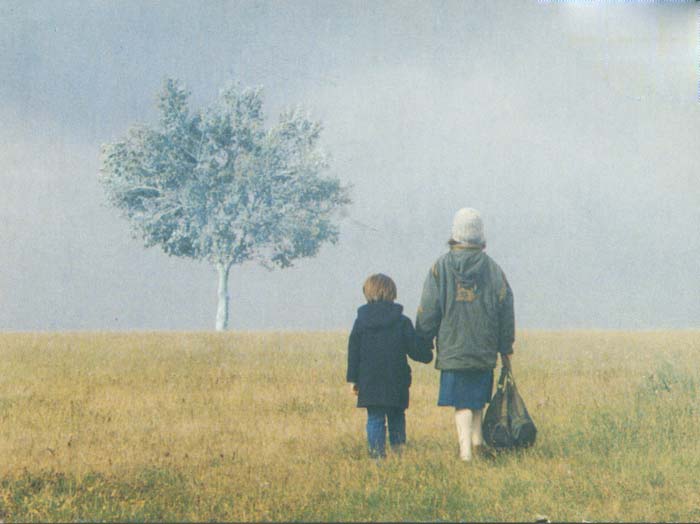
This innocent observation appropriately characterizes Angelopoulos’ cinema. From the absence of the conventional word “End” at the conclusion of his films, to his truly unfinished last one, to his penchant for interweaving variations of his personal history or episodes from earlier films into later ones, he creates a continuous, unfinished work. It is both intimately autobiographical and allegorical. Like the children in Landscape in the Mist, Angelopoulos’s films allow their audiences to cross into a space where the real and mythic intersect to map Greek and Balkan history.

Malina Stefanovska is a professor in the Department of European Languages & Transcultural Studies at UCLA
Originating from a multilingual and multicultural background in ex-Yugoslavia, Malina Stefanovska was educated on three continents: Africa, Europe, and America. She holds a B.A. from Grenoble via Université de Brazzaville, an M.A. from the University of Oregon, and a Ph.D. from Johns Hopkins University.
Professor Stefanovska also worked as an interpreter and translator for French, English, and Serbian, studied Spanish out of love, and wrote and translated literary texts and poetry in several languages. After completing her doctoral thesis on Saint-Simon, which was published as a book in France, Malina further specialized in memoir authors and autobiographical writings of Early Modern France, as well as their modern forms, from the narrative to the visual, from the fictionalized to “auto-fiction” or journal.
She is also a practicing autobiographer and recently completed a manuscript about a Macedonian childhood and family history. Her next project, related to passions and emotions in 17th and 18th century France, will consist in a study of Casanova, written in the form of letters to this author by a reader who admires him.
SUPPORT SEEFEST
Not a member yet? Become an art patron with other SEEfest arthouse aficionados in support of great events and programs, as well as our mission to keep you informed about initiatives from our wide network of fellow cultural organizations.
We Welcome YOU!
Review: And If I Don’t Behave Then What
Reviewed by Amanda L. Andrei
Open Fist Theatre Company
Through March 4

And If I Don’t Behave Then What
L.A. premiere of the new play by Iva Brdar
Ovaries on the concrete. Chin and cheek dimples with the sound of a drill. Being polite, kind, and well-behaved in the face of nameless, insidious forces.
The play consists of various vignettes, starting from Age 0 and culminating when “Woman” is in her 70s. Woman consists of Cynthia Ettinger, reading pages of printed paper or from her phone as she recounts memorable events of a life. However, Woman also consists of Carmella Jenkins, who could be interpreted as a version of a younger self, or another part of the subconscious, and at times Debba Rofheart, the most prominent candidate for the Woman’s mother, voicing the mother’s instructions to her daughter (such as the darkly humorous line, “Don’t sit on concrete, your ovaries will get cold”). And Woman could also consist of Howard Leder, playing the majority of the men’s roles, where the masculine in this world is coldly distant, silent in its brutality, or in a deadpan delivery drawing amusement from the audience, hilarious in its unawareness in giving instructions on how to parallel park.
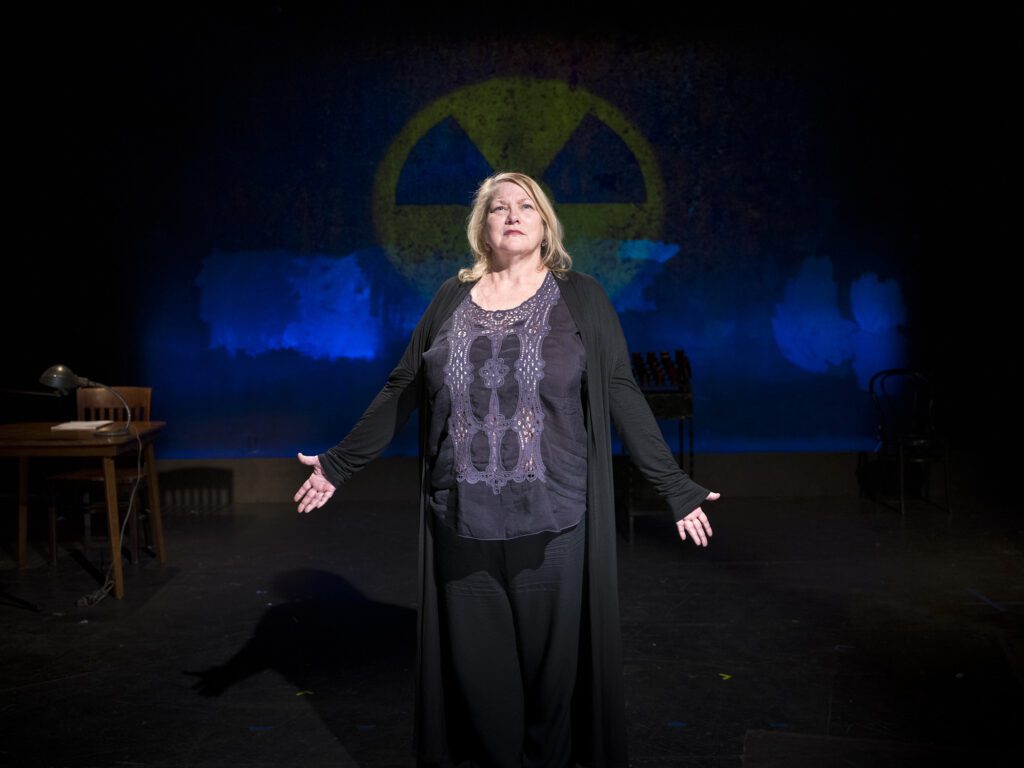
Photo by frank ishman
All these scenes seem to add up to a life that, while portrayed intimately in its details, still feels alienated in the world and to the audience. Rofheart’s “character” (if you can label that part of the text as such) never moves from the seat at the darkened desk, casting a metaphorical shadow of an ever-present yet never-interacted-with mother. And Ettinger has a lovely, soothing voice—when glancing away from the pages, she also serves us lively facial expressions and reactions.
Yet I found myself craving more from the text and questioning the choice to leave the Woman character seemingly on book. Is the Woman a writer or otherwise an intellectual? Is the story so burdensome that it needs an additional interface of pages to separate us from the pain at the heart of these vignettes? From a literary standpoint, these words and images are beautiful, but seeing it performed, I found myself living in my head, the words washing over me, wondering about who the person was behind the text.
And that may be part of the intended effect. I also found myself yearning for more grounding from the playwright’s culture, simultaneously questioning if this world was meant to be a more anonymous post-communist country. The text referenced a former communist country and teaching Marxism, but that could be so much of not only Eastern Europe, but Asia or Latin America as well. I wondered if, from a translation standpoint, there were more words from the original language that could culturally ground the text, or if from a design point, more references to the original culture of the text and its author could be included in the musical transitions or projections—not to exotify, but more to ground an audience member.
Or perhaps that is part of the whole point, that even if the playwright is identified as Serbian, the region has dealt with such a variety of labels, conflict, and grief that perhaps the priority of this performance is not culture, but rather womanhood, the multiplicity of a woman’s life, and the entanglement between mother, daughter, and other knotted ancestral ties and norms packaged up as folk culture to keep us safe. Furthermore, Director Beth F. Milles notes in the program that the piece is written as a “long tone poem” with no punctuation, and so the possibilities for this text are immense. And perhaps this immense tension is what ultimately underlies the piece—that while there are so many possibilities in life, it might still end in a strangely alluring yet alienating mystery.
Atwater Village Theatre is located at 3269 Casitas Ave in Los Angeles, CA 90039. Parking is free is in the ATX (Atwater Crossing) parking lot one block south of the theater.
To purchase tickets and for more information call (323) 882-6912 or go to www.openfist.org.

SUPPORT SEEFEST
Not a member yet? Become an art patron with other SEEfest arthouse aficionados in support of great events and programs, as well as our mission to keep you informed about initiatives from our wide network of fellow cultural organizations.
We Welcome YOU!
The Frontier Café – Conversation with Ines Tanović
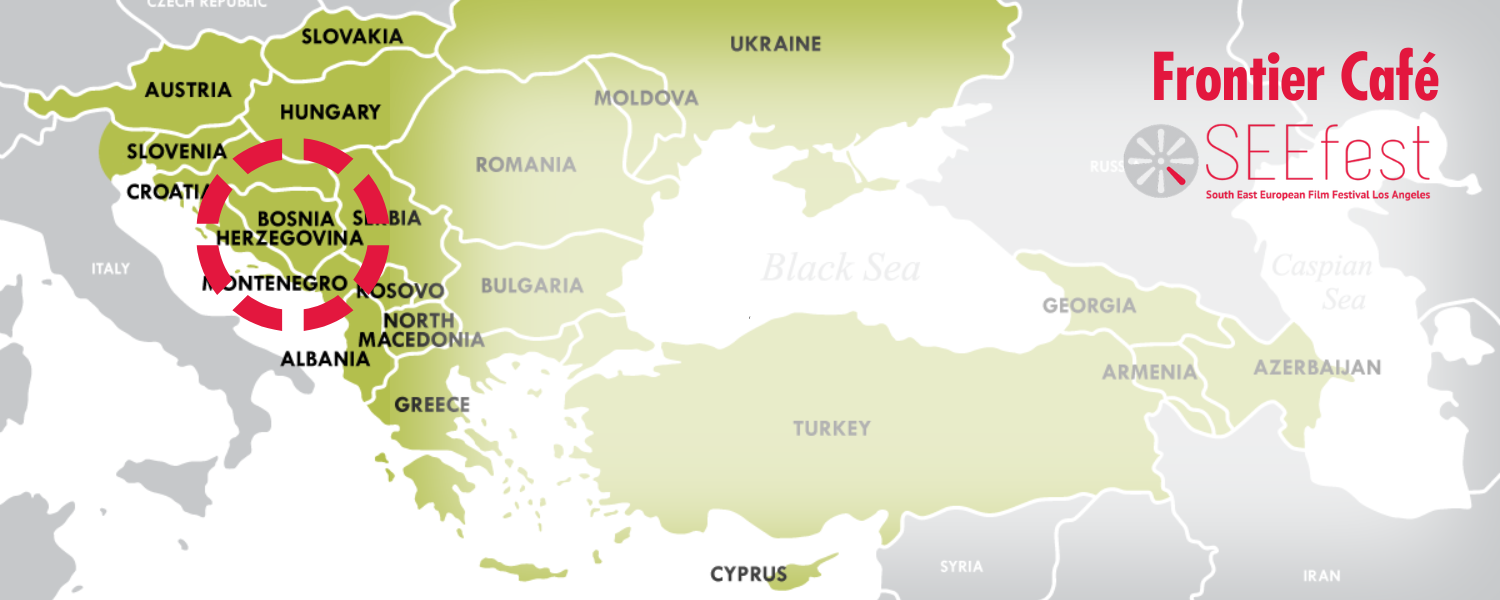
The history and future of Balkan Cinema
Please subscribe to our new podcast. Available on Anchor, Spotify, Amazon Music, Google Podcast, Castbox, Pocket Cast, Radio Public, YouTube

This episode of Frontier Cafe features a conversation with Ines Tanović, the manager of the production company DOKUMENT and the Sarajevo Film Center. The conversation, in Serbo-Croatian, went over her career as a filmmaker, the history of Yugoslav cinema, and her current efforts to promote local Balkan film cultures and auteurs.
Note: This interview is in the Bosnian language (download the English translation here).
About the Guest
Born in Sarajevo in 1965, Ines Tanović graduated at the Dramaturgy Department of the Sarajevo Academy of Performing Arts. She has been a member of the Association of Filmmakers of BiH since 1988. In 1991, with her father, Sejfudin Tanović, she founded a production called DOKUMENT in Sarajevo, which is now managed by her and Alem Babić, a producer. From 2014 to 2019, she was the president of the Association of Filmmakers of the FBiH and of the Association of Filmmakers of BiH. She is currently holding a position of acting general manager of the Sarajevo Film Centre. From 1986 to 2002, she wrote scripts and directed 6 short fiction movies. She worked as an editor at national and federal public broadcasting stations. In 2004, she was awarded by the Hubert Bals Fund for the script for “Entanglement”. She attended the Berlinale Talent Campus 2006 and her project “Decision” was selected among 160 entries from all over the world, for Berlin Today Award 2011.
In 2010, she directed the Bosnian part of the long feature omnibus “Some Other Stories” (coproduced by BiH, Serbia, North Macedonia, Slovenia, Croatia, and Ireland, supported by EURIMAGES). The film has been invited to more than 40 international festivals and earned six international awards. She is the author of a short film titled “Starting Over”, screened in the short film competition section of the 16th Sarajevo Film Festival in 2010. The film has been shown at many international festivals. Her film “Our Everyday Life” has been shown at more than 45 international film festivals and has earned 15 awards. The film was selected as a Bosnian and Herzegovinian entry for the 2015 Academy Awards.
She is the author of documentaries titled “Exhibition” (shown at the SHORT CORNER of the 2009 Cannes festival), “Living Monument” (2012), “Coal Mine” (2012), “Ghetto 59” (2013), and “A Day on the Drina” (2011), which was rewarded with the Big Stamp Award for Best Film of the 2012 ZagrebDox International Documentary Film Festival, and it was screened as a competing documentary at the 2012 Sarajevo Film Festival. Her second film “Son” premiered in the Competition Program – Feature Film at the 25th Sarajevo Film Festival (2019). The script for this film was awarded as the best project of the 2015 CineLink, and the most promising European project, as voted by LA producers, at the 2016 SEEfest LA. It has been screened at numerous international festivals.
Connect with Ines Tanović on Social Media
Instagram | Facebook | Twitter
SUPPORT SEEFEST
Not a member yet? Become an art patron with other SEEfest arthouse aficionados in support of great events and programs, as well as our mission to keep you informed about initiatives from our wide network of fellow cultural organizations.
We Welcome YOU!
The Frontier Café – Conversation with George Csicsery
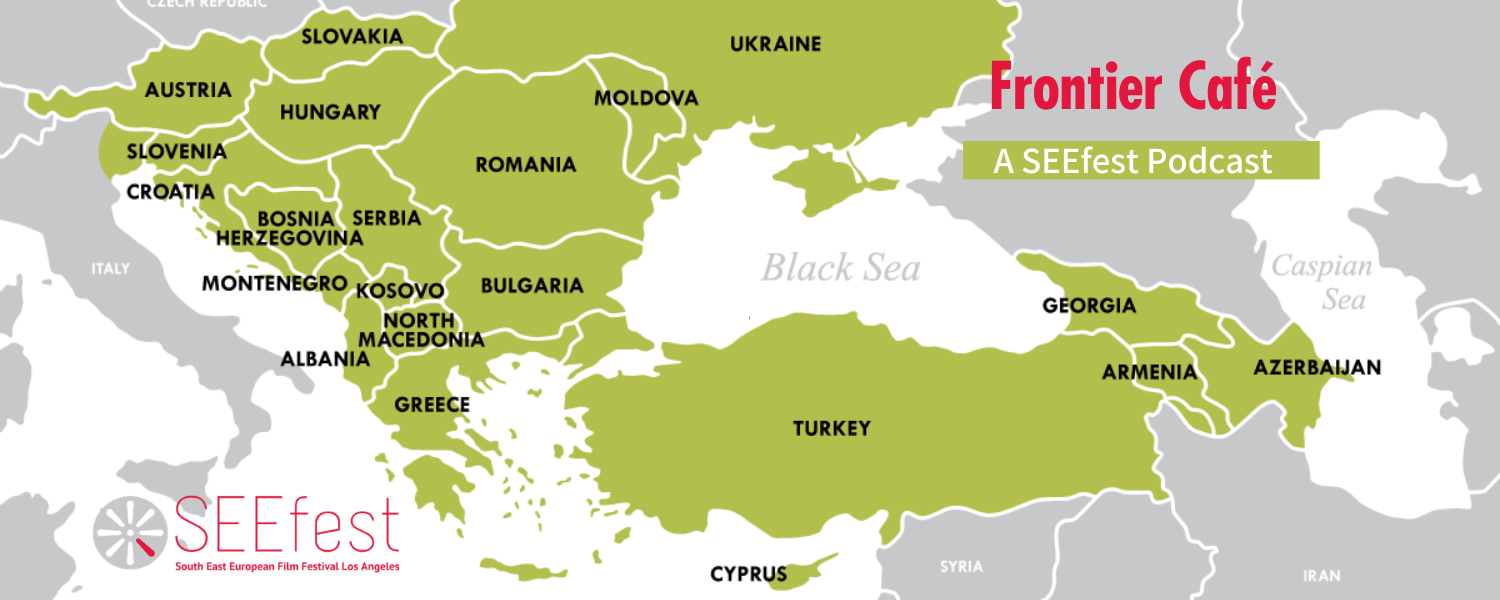
“Bringing mathematics to nonmathematical audiences.”
Please subscribe to our new podcast. Available on Anchor, Spotify, Amazon Music, Google Podcast, Castbox, Pocket Cast, Radio Public, YouTube
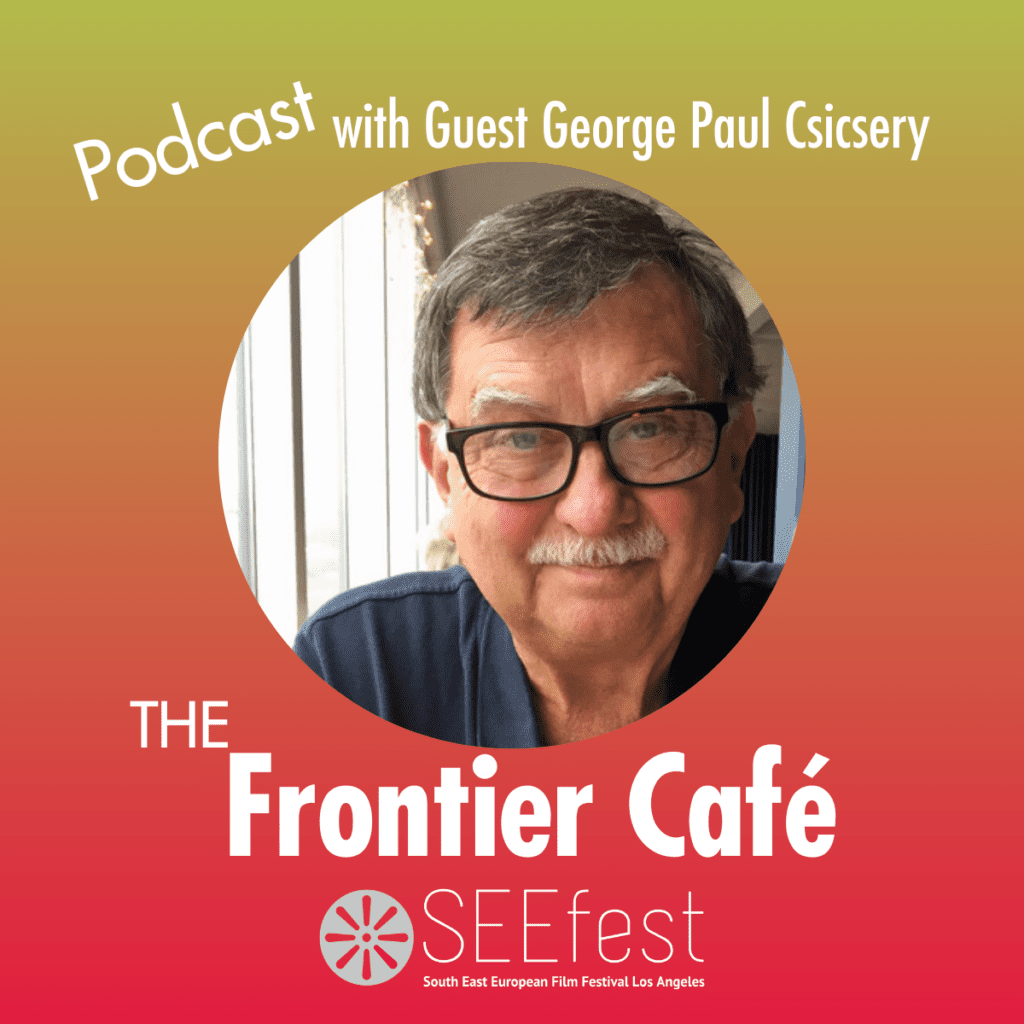
In this episode of the Frontier Café, Michael Pardy hosts a discussion with SEEFest Jury alum, writer, and prolific filmmaker George Csicsery. Csicsery and his production company, Zala Films are based in Oakland, California.
In this wide-ranging discussion, George talks about his journey from an undergrad majoring in comparative religion to his life’s work as a journalist and filmmaker and the inherent challenges and rewards in making and financing his films. He also discusses some of his latest projects, including the remarkably poignant Secrets of the Surface: The Mathematical Vision of Maryam Mirzakhani (2020) and his still-in-production, Journeys of Black Mathematicians.
About the Guest
GEORGE PAUL CSICSERY, a writer and independent filmmaker, has produced 35 documentaries on historical, ethnographic, and cultural subjects, including “Where the Heart Roams” (1987), “Hungry for Monsters” (2003), “Troop 214” (2008). “The Thursday Club” (2005), and “Songs Along A Stony Road” (2011).
He is best known for his films on mathematical topics, including N is a Number: A Portrait of Paul Erdős (1993), Julia Robinson and Hilbert’s Tenth Problem, (2008), Hard Problems: The Road to the World’s Toughest Math Contest (2008), Taking the Long View: The Life of Shiing-shen Chern (2011), Counting from Infinity (2015), Navajo Math Circles (2016), and Secrets of the Surface: The Mathematical Vision of Maryam Mirzakhani (2020). In 2009 he received the Joint Policy Board for Mathematics (JPBM) Communications Award for “bringing mathematics to nonmathematical audiences.” In 2017-2019 he was Presidential Fellow at Chapman University.
See www.zalafilms.com for more.
Connect with George Csicery on Social Media
Facebook | Instagram | Twitter
SUPPORT SEEFEST
Not a member yet? Become an art patron with other SEEfest arthouse aficionados in support of great events and programs. Our mission is to keep you informed about initiatives from our wide network of fellow cultural organizations.
We Welcome YOU!
The Frontier Café – Conversation with Dr. Ali İğmen

The history and future of Balkan Cinema
Please subscribe to our new podcast. Available on Anchor, Spotify, Amazon Music, Google Podcast, Castbox, Pocket Cast, Radio Public, YouTube

On this episode of Frontier Cafe, host Milan Zivkovic chatted with Dr. Ali İğmen, one of his favorite History professors at California State University at Long Beach (CSULB). The conversation touched on representation in film, cinema as ideology, and current films that caught our attention (for better or worse). Please enjoy the discussion merging historical perspectives with film!
About the Guest
Dr. Ali İğmen s a Professor of Central Asian History and the Director of the Oral History Program at California State University, Long Beach (CSULB). His book, Speaking Soviet with an Accent: Culture and Power in Kyrgyzstan, was published by the “Central Asia in Context Series” of the University of Pittsburgh Press in July 2012 and was a finalist for the best book award of the Central Eurasian Studies Society.
His most recent article, “Intimate Publics, Looking Back and Looking Abroad,” will appear in the collected volume Tulips in Bloom, An Anthology of Central Asian Literature, co-edited by Gabriel McGuire, Naomi Caffee, Emily Laskin, Samuel Hodgkin, and Christopher Fort.
He received his doctorate from the University of Washington in Seattle in 2004 and, as a post-doctorate visiting scholar, taught at the University of Wisconsin in Madison. He also taught classes at Kyrgyz National University in Bishkek, Osh State University in Osh, Kyrgyzstan, and Boğaziçi University in Istanbul, Turkey.
Many awards helped İğmen support his research on Kyrgyzstan, such as Fulbright Hays, SSRC, and Mellon Slavic Studies Initiative Grant.
Making Culture in (Post) Socialist Central Asia, co-edited with Ananda Breed and Eva-Marie Dubuisson, London: Palgrave Pivot, Palgrave McMillan Book Series, 2020.
Connect with Dr. Ali İğmen on Social
SUPPORT SEEFEST
Not a member yet? Become an art patron with other SEEfest arthouse aficionados in support of great events and programs. Our mission is to keep you informed about initiatives from our wide network of fellow cultural organizations.
We Welcome YOU!
The Frontier Café – Conversation with Daylyn Paul

Working in a Post-Covid Film Industry
Please subscribe to our new podcast. Available on Anchor, Spotify, Amazon Music, Google Podcast, Castbox, Pocket Cast, Radio Public, YouTube

In this episode of Frontier Cafe, host Milan Zivkovic spoke with fellow CSULB alum Daylyn Paul, a writer and filmmaker based out of Los Angeles. Recorded at Aroma Cafe in Los Angeles, Daylyn and Milan discuss working in a post-Covid film industry, historical representation in films, and how writers function in various productions. We hope you enjoy this discussion between two peers branching into different paths!
About The Guest
Daylyn Paul is a director and writer based out of Los Angeles. A graduate of California State University Long Beach and a recipient of the HFPA directing and writing grant, Daylyn has over eight years of experience in the entertainment industry. She currently works at CBS and ABC as a production assistant. Her previous works include the short film Nothing There Sings (2019) and the TV movie Suggestion Box (2019). Additionally, Daylyn was a casting assistant for the 2019 short film Flawless. She also works as a writer for an Amazon podcast set to release later in 2022.
Connect with Daylyn Paul on Social
SUPPORT SEEFEST
Not a member yet? Become an art patron with other SEEfest arthouse aficionados in support of great events and programs. Our mission is to keep you informed about initiatives from our wide network of fellow cultural organizations.
We Welcome YOU!
The Frontier Café – Conversation with Elma Tataragić

The History of Bosnian Cinema and the Role of Memory in Cinema
Please subscribe to our new podcast. Available on Anchor, Spotify, Amazon Music, Google Podcast, Castbox, Pocket Cast, Radio Public, YouTube

This episode features a conversation with Elma Tataragić. Elma currently works as a selector for the Competition Program for the Sarajevo Film Festival and is the President of the Filmmakers Association of Bosnia and Herzegovina. During our talk, we touched upon the history of Bosnian cinema, her work with film students, and the role of memory in film. Please enjoy our conversation demonstrating the untapped potential of films and their impact on local and global communities!
NOTE: The language spoken in this interview is Bosnian/Croatian/Serbian (link to English translation or watch on YouTube with English captions)
About The Guest
Elma Tataragić (1976) is a scriptwriter, professor and festival programmer. She graduated Dramaturgy (Screenwriting and History of Cinema) at Sarajevo Academy of Performing Arts and obtained her Master of Science degree and PhD in Film and Literature. She has been with Sarajevo Film Festival since it was founded in 1995, where she now works as selector for Competition Programs and CineLink Industry Days.
She co-wrote short film First Death Experience (2001) and wrote and produced short North Went Mad (2003), both directed by Aida Begić. She has produced and co-written the feature film Snow (2008) also directed by A. Begić, shown in the Semaine de la critique at Cannes Film Festival 2008, where the film won the Grand Prix. The film has been shown at over 80 festivals and won over 30 international awards. She is the General Secretary and a member of Filmmakers Association of Bosnia and Herzegovina. She has been teaching screenwriting at Sarajevo Academy of Performing Arts since 2002, now as a professor.
She is member of European Film Academy and has published a book on screenwriting and is also works as a script consultant. In 2016 she has completed her short fiction film I Remember, which is successfully touring the world film festivals. The feature film When The Day Had No Name (2017) directed by Teona Mitevska which she has co-written premiered in Panorama Special at Berlinale 2017. She is currently in preproduction of two feature films she has written: Stitches to be directed by Serbia director Miroslav Terzić and God Exists And Her Name Is Petrunija by Macedonian director Teona Mitevska. She’s also developing a new feature and short experimental films.
Connect with Elma on Social
SUPPORT SEEFEST
Not a member yet? Become an art patron with other SEEfest arthouse aficionados in support of great events and programs. Our mission is to keep you informed about initiatives from our wide network of fellow cultural organizations.
We Welcome YOU!

